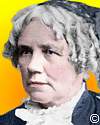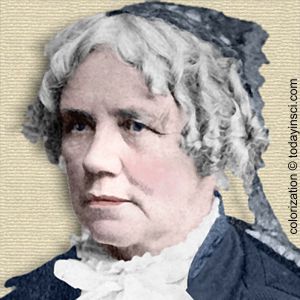 (source)
(source)
|
Maria Mitchell
(1 Aug 1818 - 28 Jun 1889)
American astronomer who was the first professional woman in the field in the United States.
|
Maria Mitchell, Famous Savant.
"Every formula which expresses a law of nature is a hymn of praise to God."
by J.A. STEWART.
“SOME of these Europeans are far ahead of us in many things. I think we are in advance only in one democracy of freedom. But then, that is everything.”
Thus wrote Dr. Maria Mitchell, the eminent astronomer, when in Russia over forty years ago [1873], praising its public scientific spirit; its work for liberty in freeing twenty-three million serfs in 1861; the culture of its intelligent women, thousands of whom were even then studying science in St. Petersburg; and the democracy of its churches.
“The oneness and equality before God are always recognized,” she declared; “the crowd stands or kneels literally on the same plane.” This condition was especially pleasing to the distinguished scientist, who was both exceedingly democratic in her views and simple and liberal in her religious convictions.
“There is a God and he is good, I say to myself. I try to increase my trust in this, my only article of creed.”
When Dr. Maria Mitchell was born on Nantucket Island, August 1, 1818, her birthplace was a small but nourishing whaling station, mainly populated by Friends, to which sect both her parents belonged. Both were schoolteachers, and counted Benjamin Franklin among their ancestors; and no descendant of that great scientist and statesman seems to have inherited more of his strength of purpose and virile intellect than Maria Mitchell.
She early showed her mathematical ability, which was thoroughly developed under her father’s gentle, fine tuition and that of the principal, Cyrus Peirce, afterward head of the first normal school started in the United States. Even before she understood the processes by which the formulae of the famous “Bowditch Navigator” were obtained she applied them promptly and readily to the investigations of her scholarly father, who was an enthusiastic astronomer, and impressed his children with the feeling that astronomy was the most important study in the world.
Miss Mitchell became assistant teacher at Mr. Peirce’s school and for a brief time also conducted a private school of her own. At eighteen she was appointed librarian of the Nantucket Athenaeum and during twenty years there, found opportunities for the thorough scientific studies which gave her an honored place among the ablest scientists of her time. Nantucket was an excellent locality for the study of astronomy. Every pleasant evening found Maria Mitchell at the telescope studying the starry firmament.
Fame first came to her with the discovery of a telescopic comet on October 1, 1847, for which she received the prize medal of the King of Denmark, to whom her discovery was reported by President Edward Everett of Harvard College. Her father was one of the trustees of the College. This discovery was supplemented by other scientific papers which gave the young woman astronomer an international reputation.
She was invited to visit Great Britain by the authorities of Cambridge University, where she was received with great distinction. Sir John Herschel, the great astronomer, and Thomas Carlyle welcomed her, as did other European savants, including Alexander von Humboldt and Leverrier.
It was about this time that Maria Mitchell wrote self-searchingly in her diary: “The best that can be said of my life so far is that it has been industrious, and the best that can be said of me is that I have not pretended to what I was not.”
Industry, patience, and integrity were her marked characteristics. She was direct, vigorous, and incisive in mind, frugal in habit, sincere, frank, witty, and good-humored. Deeply religious and thoughtful, her eager mind looked forward constantly.
“The world of learning is so broad and the human soul so limited in power! We reach forth and strain every nerve, but we seize only a bit of the curtain that hides the infinite from us.” These words were uttered in 1854. Twenty-five years later, at the height of her fame as a professor in Vassar College and director of its astronomical observatory, she wrote cheerfully, “I am hopeful that scientific investigation, pushed on and on, will reveal new ways in which God works, and bring to us deeper revelations of the wholly unknown.”
Standing in the Observatory of Rome, Miss Mitchell said to herself: “I know of no picture in the history of religion more weakly pitiable than that of the Holy Church trembling before Galileo, and denouncing him because he found in the Book of Nature truths not stated in their own Book of God, forgetting that the Book of Nature is also a Book of God. . . . The telescope must keep very accurately the motion of the earth in its axis; and so the papal government furnishes nice machinery to keep up this motion,—the same motion for declaring whose existence Galileo suffered! The two hundred years had done their work.”
As a college professor, Dr. Maria Mitchell’s teaching was marked not alone by the highest degree of technical skill, but also by a breadth of sympathy and enthusiastic love of youth which made her influence strong and permanent. She was an unconscious preacher invoking high aspirations.
“If we cannot learn through Nature’s laws the certainty of spiritual truths,” she said to her students, “we can at least learn to promote spiritual growth while we are together, and live in a trusting hope of a greater growth in the future.”
On the tablet erected to her memory in 1907 in the Hall of Fame, New York University, eight years after her passing, there were fittingly inscribed her own words. They are the keynote of her broad views and liberal outlook during a remarkably useful career of over threescore years and ten.
“Every formula which expresses a law of nature is a hymn of praise to God.”
Along with these words is her favorite axiom,—
“Do not neglect the infinites for the infinitesimals.”
- Science Quotes by Maria Mitchell.
- 1 Aug - short biography, births, deaths and events on date of Mitchell's birth.
- Maria Mitchell: A Life in Journals and Letters, by Henry Albers. - book suggestion.





